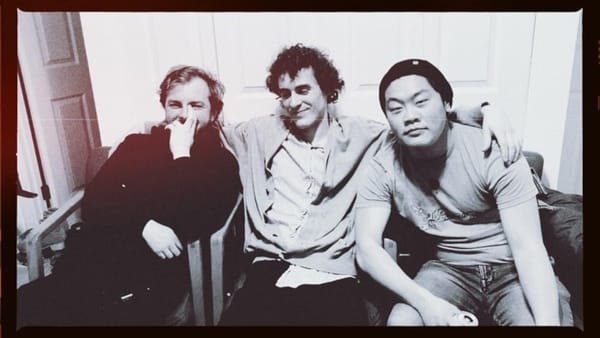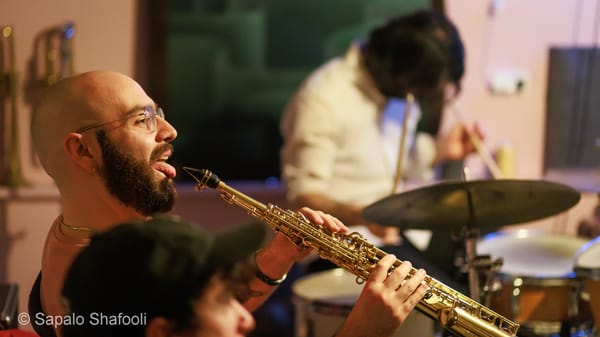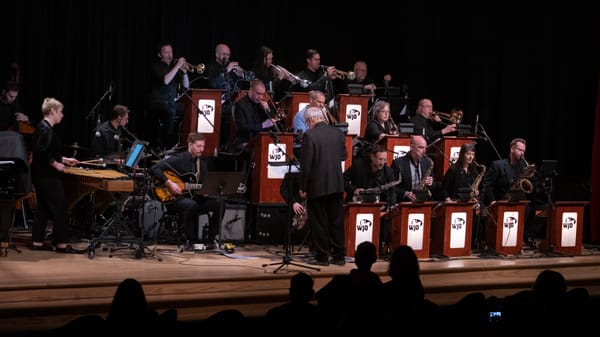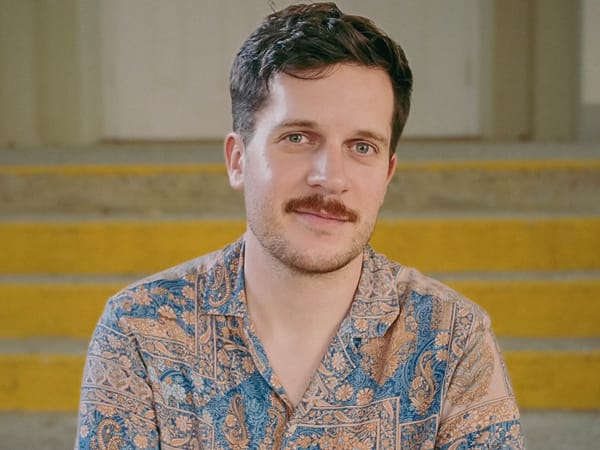Daniel Hersog: Jazz Orchestra, Open Spaces, jazzfest show
Open Spaces (Folk Songs Reimagined) is out June 23 followed by a release concert June 26
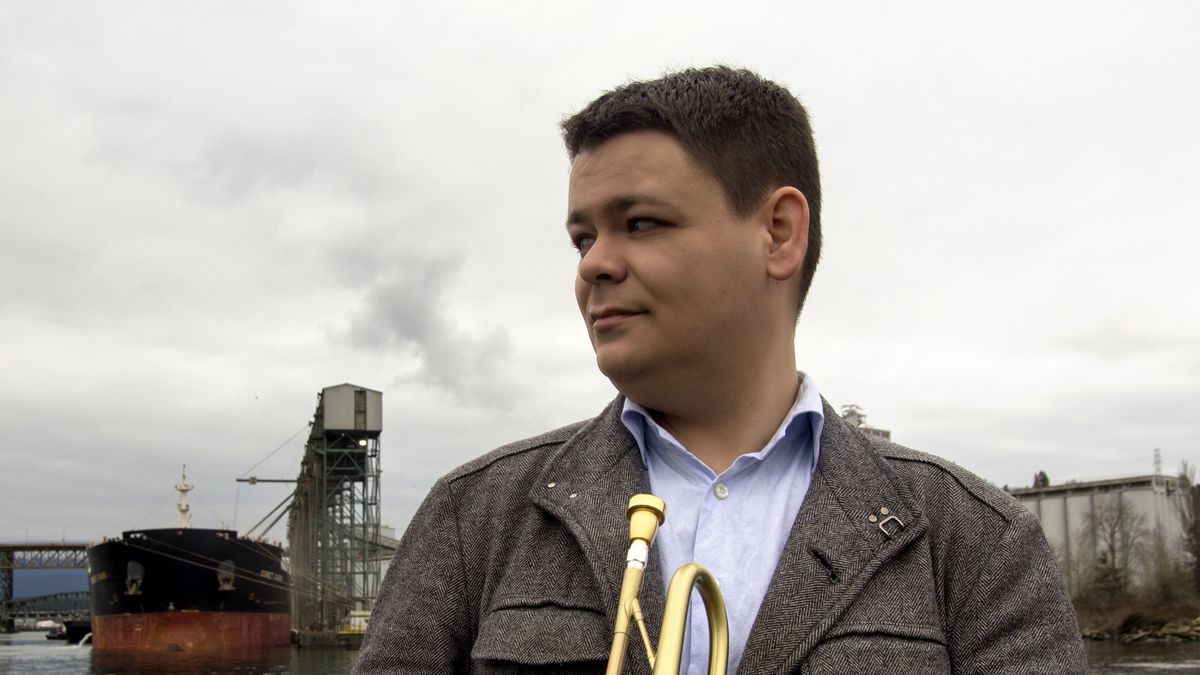
The Daniel Hersog Jazz Orchestra's second album Open Spaces (Folk Songs Reimagined) releases on June 23, 2023 followed by a release concert, on Monday, June 26th, at the Shadbolt Centre in Burnaby.
Tickets here for the concert, which starts at 8:00pm.
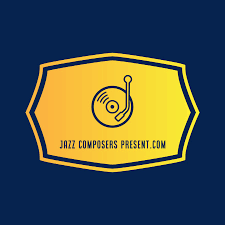
A friendly shout-out (not a formal sponsorship) to the folks at JazzComposersPresent. They stream listening sessions, Q&As, and more educational content around the topic of composition, featuring many great guests. Go to jazzcomposerspresent.com to learn more about them.
Daniel recorded Open Spaces with the band last year in two days, right after a concert at Pyatt Hall. Here's what he singled out in our interview as his most vivid memory of the time in-studio:
"I think it was probably Scott Robinson playing "Shenandoah". The take that we used was a complete third take, and that was when he played the melody the second time up the octave. Scott blew the roof off the place with that one. I mean, I was in tears conducting the outro. It's a stressful situation, you're on no sleep anyway, so you're a little fragile going in. But then just the beauty of his delivery of that melody!"
The album opens with a cover of Gordon Lightfoot's "Wreck of the Edmund Fitzgerald", of course created before Lightfoot's May 1, 2023 passing. Daniel used his cinematic arranging style to set the mood with this piece:
"The ostinato to me represents the dock workers diligently, assembly-line style, filling up the next round of ships to go. It's like writing a film score to a film that only exists in my mind. Like the soaring trumpet melody was kind of like, it was always placid after the storm, so it was a gorgeous morning on the lake as boats took off in the sun. So it's very scenic, like when you're moving through the different moods of the arrangement, it's really all about moving from scene to scene of what you're trying to capture."
On another cover, "Ahead by a Century" by The Tragically Hip, I heard the Brad Turner Quartet's sound burst out of the arrangement for Brad's trumpet solo. It wasn't even the members of the BTQ other than the leader, yet the intensity of the focus at that moment struck me. Daniel told me that he values being able to do this:
"I love working with improvisers. I like to let them be jazz musicians. I try and keep my hands off of things that are overly prescribed for the solo. I mean, I write harmony, but instead of everything being so written, so prescribed, I want to have a part where now the rhythm section gets to be a rhythm section and play a straight-eighths groove."
The groove he's referencing is on the track "How Many Roads", which Daniel identifies as a "re-composed" version of Bob Dylan's "Blowin' in the Wind".
On "Rentrer", we're treated to an amazing bass solo that Daniel didn't have to solicit very directly at all – simply giving the bassist an amount of time and free reign:
"I don't know anyone else who plays the bass like Kim Cass He's an out-of-control virtuoso and also a wildly diligent preparer. I had charts for everyone, but he had printed off his own and they were covered in super-specific notes."
Open Spaces closes with "Red River Valley" and what I'd call premium gang vocals – not a roughly-pitched unison chant, instead a touching collection of voices. I agree with Daniel that it's a fitting closer:
"Frank Carlberg, the pianist, he grew up in Finland. In music class, they had a book of songs from around the world, and the Canadian page was "Red River Valley". I remembered singing it as a kid, with my family. So I thought, fuck it, we're gonna sing. Like, this is folk music. This is music that people sing, that people remember singing."
Notably, Kurt Rosenwinkel plays guitar in the ensemble. It's not the only time he's guested on an epic Canadian project lately, though I enjoyed hearing more from Daniel about the strategy to bring him in successfully:
"He recorded from Berlin. I wanted to try and find a way to feature him that wouldn't make it feel weird during the recording session. So that's why there's not like a lot of open solo sections where he's playing. I didn't want it to feel like an Aebersold session for the people in the room, so I just tried to find ways where he could play over things we were already doing. In 'Canadian Folk Song', he has a little bit where it's just him and rhythm section, but then he is playing over top of that chorale. And I chose to do that because recording the chorale makes sense without the guitar solo. We had enough to keep ourselves busy, and then he was the icing on the cake."
Open Spaces follows the band's 2020 debut album Night Devoid of Stars, the darker mood of which Daniel says was "unified by the political undertones of that time".
This new album is lengthier, filled beyond the choice covers with original compositions. It marks three great achievements for the composer-arranger-bandleader: once again assembling an all-star lineup, thoughtfully writing and compiling the repertoire, and letting the members' personalities shine. To close with what I hear as the central thought of Daniel's creative process in his Jazz Orchestra:
"I wrote, for all the soloists, all those solo sections for the specific people who soloed on the record. I have a lead trumpet player who can play incredibly high, so a couple times in the album I access that unique quality. A trombonist who can play great euphonium too and is good with valves, so I was able to get that other colour in the writing. It's trying to know what people can do, highlighting their strengths."
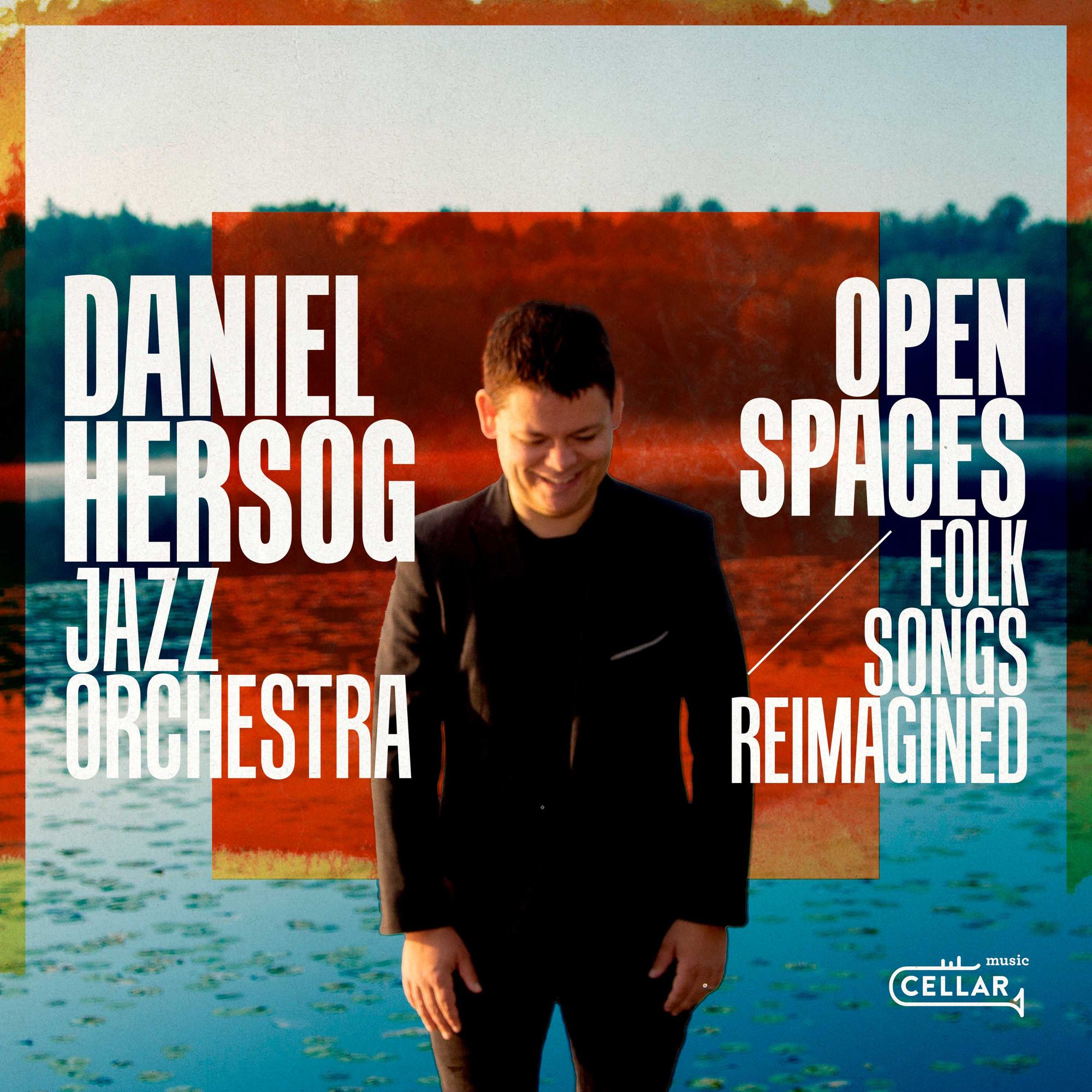
Open Spaces (Folk Songs Reimagined): The Wreck of the Edmund Fitzgerald; How Many Roads; Ahead by a Century; Shenandoah; I Hear; Jib Set; Canadian Folk Song; Rentrer; Sarracenia Purpurea; Red River Valley. (1:15:08)
Personnel:
- Conductor: Daniel Hersog
- Woodwinds: Ben Kono (oboe, soprano, flute, clarinet), Ben Henriques (alto, soprano, clarinet), Noah Preminger (tenor), Tom Keenlyside (flutes, tenor), Scott Robinson (bari, bass clarinet, flute)
- Trumpets/flugelhorns: Michael Kim, Brad Turner, Derry Byrne, Jocelyn Waugh
- Trombones: Jeremy Berkman, Jim Hopson (also euphonium), Andrew Poirier, Sharman King (bass)
- Rhythm: Kurt Rosenwinkel (guitar), Frank Carlberg (piano), Kim Cass (bass), Dan Weiss (drums)

